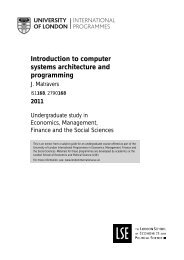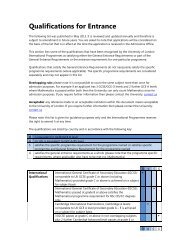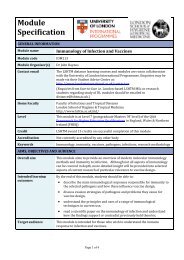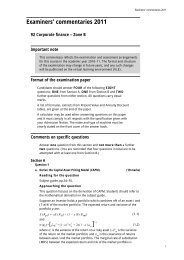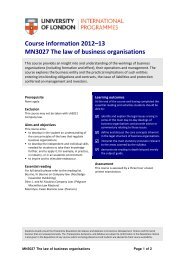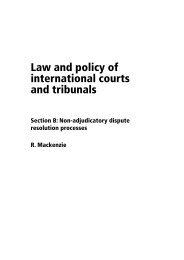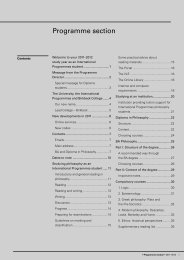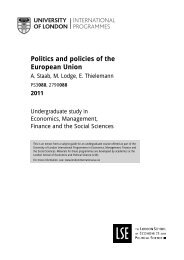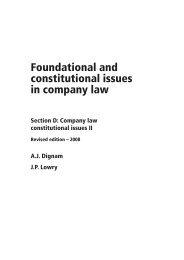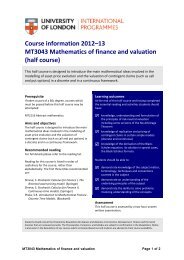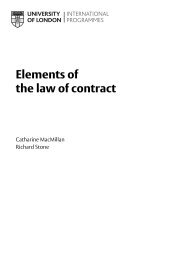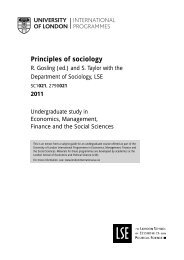Public law - University of London International Programmes
Public law - University of London International Programmes
Public law - University of London International Programmes
Create successful ePaper yourself
Turn your PDF publications into a flip-book with our unique Google optimized e-Paper software.
page 42 <strong>University</strong> <strong>of</strong> <strong>London</strong> <strong>International</strong> <strong>Programmes</strong><br />
M v Home Office<br />
An example <strong>of</strong> judicial control can be seen in the case <strong>of</strong> M v Home Office [1994] 1 AC 377.<br />
See re M [1993] 3 WLR 433 in section 5.4.1 <strong>of</strong> this guide.<br />
The judges exercise self-restraint<br />
in the areas <strong>of</strong> power that they<br />
regard themselves as competent to<br />
review. Many exercises <strong>of</strong> the royal<br />
prerogative, for example (see Chapter<br />
6), involve issues <strong>of</strong> ‘high policy’: such<br />
diverse matters as the appointment<br />
<strong>of</strong> ministers, the allocation <strong>of</strong> financial<br />
resources, national security, signing <strong>of</strong><br />
treaties and defence matters. In order<br />
to protect judicial independence and<br />
the appropriate separation <strong>of</strong> powers,<br />
judges will rule that such matters are<br />
for the executive to decide.<br />
An example <strong>of</strong> this is seen in the<br />
case <strong>of</strong> Council <strong>of</strong> Civil Service Unions<br />
v Minister for the Civil Service [1985]<br />
AC 374 (the GCHQ case). The Prime<br />
Minister had ordered that workers at<br />
the Government’s Communication<br />
Headquarters (the signals intelligence<br />
body) should no longer be allowed to<br />
be members <strong>of</strong> trade unions, a right<br />
which had been enjoyed for several<br />
decades. The Union challenged the<br />
legality <strong>of</strong> the ban. The Court <strong>of</strong> Appeal<br />
and House <strong>of</strong> Lords ruled that where<br />
national security was an issue, the<br />
courts would not interfere.<br />
Activity 4.1<br />
a. Consider M v Home Office and the GCHQ case and briefly explain their significance<br />
in relation to the separation <strong>of</strong> powers.<br />
b. Why do you think the judges responded in different ways to the facts <strong>of</strong> these<br />
cases?<br />
4.2.3 Legislature and judiciary<br />
Explain your opinion<br />
In many <strong>of</strong> the activities in this subject guide, you will be asked for an<br />
opinion. Here are some examples:<br />
Activity 8.1: What advantages, if any, can you identify in having a<br />
hereditary head <strong>of</strong> state?<br />
Activity 9.4: Write a brief passage outlining the strengths and weaknesses<br />
<strong>of</strong> question time as a means <strong>of</strong> scrutinising the government, and<br />
explaining what reforms you think should be made to the rules and/or<br />
procedure.<br />
Activity 12.2: Do you think Parliament should be immune from<br />
interference by the courts? Is this immunity necessary? Are there any<br />
circumstances in which the courts would be justified in intervening?<br />
Many academics, politicians and legal experts have written on these<br />
subjects. Often they disagree with one another.<br />
When you have studied this guide, read your textbook and thought about<br />
these issues, you will be capable <strong>of</strong> giving your own opinion. In answering<br />
these questions, and examination questions on the same subjects, we<br />
do not mind what answers you give – provided that you can present a<br />
coherent and well-reasoned response. We are not interested in answers<br />
that merely repeat the ideas <strong>of</strong> some expert.<br />
After all, whose opinion do the examiners want to test?<br />
Your tutor’s opinion?<br />
The opinion <strong>of</strong> the authors <strong>of</strong> your textbook?<br />
Your opinion?<br />
Parliament is the supreme <strong>law</strong>-making body within the UK. Judges interpret legislation<br />
using the ‘rules’ <strong>of</strong> statutory interpretation which you will study in the Common <strong>law</strong><br />
reasoning and institutions subject guide. Constitutionally, judges have no power to<br />
question the validity <strong>of</strong> legislation: see Pickin v British Railways Board [1974] AC 765<br />
discussed in Chapter 7. However, within the constraints imposed by the ‘rules’ there<br />
remains a certain amount <strong>of</strong> leeway for the judges to give new meaning to statutory<br />
language, and this raises the question <strong>of</strong> whether the judges ‘make <strong>law</strong>’. This aspect <strong>of</strong><br />
the judicial role is enhanced under the Human Rights Act 1998 (see Chapter 15) which<br />
imposes a duty on the judges to interpret legislation ‘as far as possible’ in a manner to<br />
make it compatible with Convention rights. Where this is not possible, however, the<br />
superior courts (High Court and above) can issue a ‘declaration <strong>of</strong> incompatibility’ but<br />
cannot declare an Act <strong>of</strong> Parliament invalid. The effect <strong>of</strong> this arrangement preserves<br />
both the supremacy <strong>of</strong> Parliament and also the separation <strong>of</strong> powers.<br />
The development <strong>of</strong> common <strong>law</strong> also raises the issue <strong>of</strong> judicial <strong>law</strong>-making. You will<br />
realise when you study the doctrine <strong>of</strong> precedent that judges are able to develop the<br />
<strong>law</strong> in line with contemporary requirements. While all <strong>of</strong> common <strong>law</strong> is judge-made<br />
Go to your study pack and<br />
read the brief extract from<br />
Merkur Island Shipping Corp v<br />
Laughton (The Hoegh Anapa).<br />
You can read the whole case<br />
report via the Online Library.



